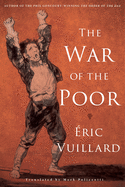
French author Éric Vuillard follows up his Prix Goncourt-winning The Order of the Day, about the Nazi annexation of Austria in 1938, with an even more timely examination of a pivotal historical moment, the German Peasants' War of 1524-1525. The War of the Poor is a brief but energetic retelling that focuses on eternal questions of inequality, revolt and compromise. It also serves as an attempt to capture the revolutionary essence of one of the war's chief figures, the radical preacher and theologian Thomas Müntzer.
Vuillard takes an unusual approach to the subject matter, opting for lyrical meditation over any attempt at a comprehensive retelling of events. He places particular emphasis on the relationship between theological beliefs and economic realities, writing that Müntzer's impoverished adherents had a hard time understanding "why the God of the poor was so strangely on the side of the rich, always with the rich. Why his words about giving up everything issued from the mouths of those who had taken everything." Martin Luther, so often depicted as a revolutionary figure, comes off as cautious and compromising compared to Müntzer, whose rhetoric became violent and absolutist.
The War of the Poor situates the German Peasants' War in a long line of peasant rebellions, a line that implicitly extends to the inequality-ridden present. Vuillard's book is in itself a kind of sermon, a broadside against "the voice of order, to which we are ultimately so attached that we surrender to its mysteries and hand it our lives." It is a rowdy, passionate work of history. --Hank Stephenson, manuscript reader, the Sun magazine

